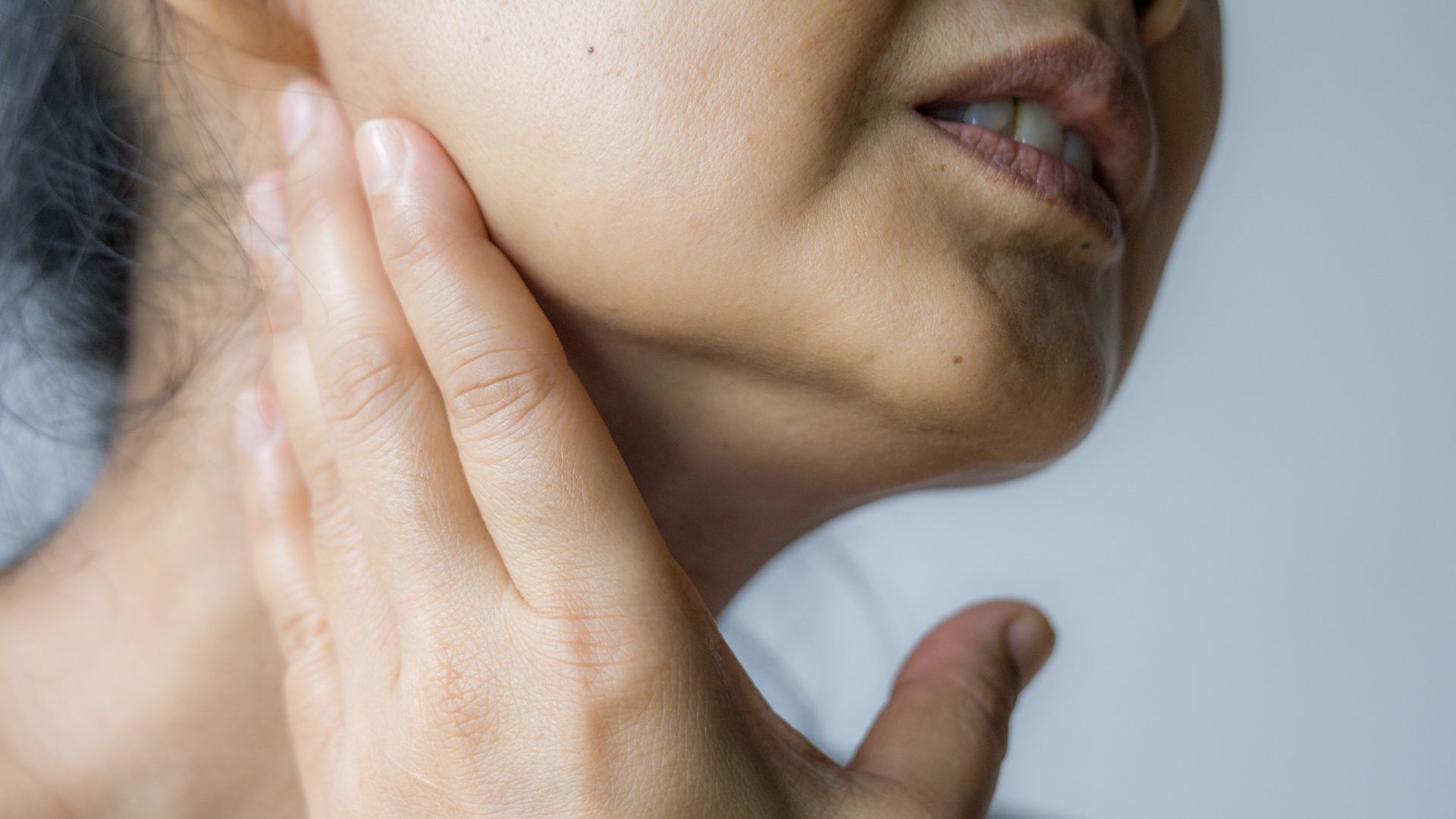
Hot flashes, mood swings and insomnia might be some of the more obvious menopause symptoms, but hormonal changes can cause issues to specific areas of the body - including ones you might not expect like the teeth, gums, mouth and tongue.
In fact, in a study looking at menopause symptoms by Delta Dental, it was found that 84% of women approaching menopause didn't know how the hormonal change would affect their oral health. Yet, it's one of the most common symptoms of perimenopause.
"Oral health problems during menopause are incredibly common. As a cosmetic dentist, many of my female patients seek cosmetic dentistry treatment around the age of 45 to 55, as this is when they notice the most significant changes in their teeth,” says Dr Sam Jethwa, the president-elect of the British Academy of Cosmetic Dentistry and an award-winning cosmetic dentist.
Some of these changes include increased tooth sensitivity, tooth decay, pain and inflammation in your gums (known as gingivitis). Here, woman&home speaks to several dentists and menopause experts to reveal more about exactly how menopause affects oral health - and what to do about it.
Does menopause affect teeth and gums?
Yes, menopause has the potential to affect every part of a woman’s body - and the teeth, gums, and mouth are included in this. During menopause, oestrogen levels naturally decline and as the hormone is needed to maintain bone density, this can contribute to bone loss in the jawbone - as well as other parts of the body like the spine and hips.
Bone loss in the jaw increases the risk of several dental issues, including loose teeth, tooth loss, and the onset of gum disease, all of which have uncomfortable or painful symptoms.
Tooth pain
Menopause and tooth pain can, unfortunately, go hand-in-hand - and tooth decay is one of the more common causes as teeth and gums become very susceptible to hormonal changes in the body. According to research by Shree Bankey Bihari Dental College and Research Centre, this decreases the body's ability to fight off minor infections and maintain a balance of 'good' and 'bad' bacteria within the mouth.
"Menopause can lead to decreased saliva production and saliva is essential for washing away food particles and neutralising acids. Without it, the risk of tooth decay increases," says GP and women's health specialist Dr Deepali Misra-Sharp.
Hormonal changes also make gums more sensitive and prone to swelling, which can be painful and cause tooth pain.
Tooth sensitivity
Tooth sensitivity - often manifesting as a sharp feeling when you eat or drink something cold - happens when the protective layer of enamel has worn away and the layer of soft dentine within the tooth is revealed.
The enamel ends where the tooth and gums come together. If you have receding gums, the tooth roots will be exposed. As these don't have a protective layer, it's bound to cause some sensitivity.
Some women might find that brushing their teeth too hard and eating and drinking certain foods causes this protective layer to wear away, leading to tooth sensitivity.
"Bone loss in the jaw thanks to the decline in oestrogen can also cause increased sensitivity, as well as loose teeth and teeth falling out," says Dr Jethwa. He recommends using a soft-bristled toothbrush if your gums are painful, along with an anti-bacterial mouthwash.
Clenching and breaking
Bruxism - grinding the teeth or clenching the jaw - is linked to anxiety, stress, and insomnia. These three conditions, as many unfortunately know already, skyrocket during menopause.
Dr Jethwa says bruxism can damage the teeth by wearing down the enamel, flattening the teeth, chipping them and sometimes causing them to become loose. He says: “Your GP or dentist will advise the best treatment for your case, but this may include a mouth guard (this protects the teeth, but it does not stop the motion), masseter Botox (to relax the muscles) and cosmetic braces (if teeth grinding is caused by the bite).”
Teeth grinding or clenching can lead to face, neck and shoulder pain, headaches and disturbed sleep too.
Sarah Shah, who is a menopause coach, had serious problems with her teeth when she went through menopause but it took her a while to understand that the cause was down to her changing hormones. Dental treatments she needed included “fillings, both in teeth and on the front of teeth, an implant to replace a tooth, aligners to straighten teeth after grinding, having to wear a retainer every night to stop my teeth grinding and my teeth moving back."
If you're worried about your teeth in menopause, it's best to go to the dentist regularly. That way, you can get ahead of the problem before it starts.
Tooth loss
As noted by both our experts, tooth loss is unfortunately a side effect of the bone loss in the jawbone. The hormonal changes can also make you more susceptible to gum disease, which can lead to periodontitis - a more severe type of gum disease which affects the bone supporting your teeth.
Dental hygienist Alice Garside, from the Neem Tree Practice in Esher, says she has had two patients in her surgery who have had such bad oral health problems during menopause that they’ve lost almost 50% of their teeth. “So many women will say to me, ‘I don’t understand, I do so much more than my husband and my teeth are in such a state’, and I say to them ‘Yes it’s because you’re a woman’,” she says on menopause and tooth pain.
This is also something Shah experienced: “I was brushing twice a day, using a water flosser and tape floss and doing everything I could to protect my teeth. It made me feel like an old woman and I thought I would end up with dentures.”
Oral infections
The oral health problems linked to menopause don't just affect the teeth and gums though. "Reduced saliva and hormonal changes can make you more susceptible to oral infections like thrush (oral candidiasis), which is a yeast infection in the mouth," says Dr Misra-Sharp.
"This reduction in saliva may also lead to more sores, ulcers or cuts inside your mouth, which can be painful," she says.
How to avoid tooth pain in menopause
Avoid citrus fruits
One of the ways to protect your teeth in menopause is to avoid eroding the enamel on your teeth. When you lose enamel, the soft dentine is exposed and this commonly leads to tooth sensitivity and pain.
"Avoid any food or drink that will affect the enamel on your teeth, especially those that are acidic like citrus fruits," says Dr Jethwa. Apples, grapes, blueberries, pineapple, peaches, pomegranates, fizzy drinks, fruit juices, vinegar-based products, and some gut-healthy foods like sauerkraut are also best avoided to protect the teeth as well.

Increase calcium and vitamin D intake
Vitamin D and calcium, which can be taken together as one supplement if you need to, are essential for maintaining strong teeth and bones.
"Ensure your diet includes plenty of calcium-rich foods (like dairy, leafy greens, and fortified products) and get enough Vitamin D, either from sunlight or supplements," says Dr Misra-Sharp.
If you wear sunscreen on your face year-round, you'll likely need a vitamin D supplement even in the sunnier months. However, consult your doctor before adding any additional supplements to your routine or changing your diet significantly.
Stay hydrated
When it comes to protecting your teeth in menopause, proper saliva production is essential. Some people experience dry mouth during menopause, which means there isn't sufficient saliva to keep bacteria off your teeth.
Dr Misra-Sharp advises drinking plenty of water and using “saliva substitutes or moisturisers that can help and that can be prescribed by your GP," she says.
Regular dental care
It sounds simple, but making sure your oral hygiene routine is in the best shape possible is one of the best ways to avoid teeth issues during menopause. When it comes to brushing your teeth properly, "you need to brush the outside of the teeth, inside of the teeth, tongue (can you tongue scraper if prepared, but a toothbrush is fine) and the roof of the mouth," says Dr Jethwa.
Dr Misra-Sharp and Dr Jethwa both also advise using an anti-bacterial mouthwash and Dr Jethwa says you should make sure your toothpaste “contains the correct amount of fluoride, this should be 1,350-1,500ppm for adults”.
Professional treatments
Should you need more help, speak to your dentist about your options. Professionals can carry out fluoride treatments to strengthen the enamel - although there is a limited amount even professionals can do with lacking enamel.
Cosmetic teeth treatment may also be needed if your teeth are damaged or need to be removed, such as veneers or composite bonding. "These can help to both strengthen the teeth and allow them to appear aesthetically pleasing - fixing any chips, cracks and discolouration," says Dr Jethwa.
Can HRT help your teeth?
Hormone Replacement Therapy (HRT) replaces the hormones lost during menopause so it can be a useful tool if you're struggling with teeth issues resulting from hormonal changes during menopause.
"Oestrogen replacement can help maintain bone density, including the bones that support your teeth. Some studies suggest HRT might reduce the risk of gum disease and tooth loss by mitigating the effects of oestrogen deficiency," says Dr Misra-Sharp.
In a study linked to the Federal University of Bahia, published in the prestigious Menopause journal, it was found that rates of gum disease in women taking HRT were 44% lower than in those who were not.
Menopause teeth vs menopause mouth
It’s not just your teeth which can be affected during menopause. You might also experience changes and problems with your mouth and tongue.
- Dry mouth: Dr Misra-Sharp says the drop in saliva might cause "dryness, difficulty swallowing or speaking, a sticky feeling in the mouth, and an increased need for water. Dry mouth can also cause bad breath (halitosis) and make you more prone to cavities".
- Burning mouth syndrome: An unpleasant symptom which some studies suggest can occur in 15% of women during menopause. Dr Jethwa says it’s when you’re left with a “burning sensation, and sometimes tingling and numbness” in your mouth. Dr Misra-Sharp says the cause of BMS is unclear but it seems to be linked to hormonal imbalances. She says: “Reduced oestrogen may lead to changes in nerve function in the mouth, causing a burning sensation.”
- Change in taste: Some women may notice changes in their sense of taste and experience a metallic or bitter taste in their mouths, says Dr Misra-Sharp. Our taste buds and sense of smell can change as we age and this can become worse during menopause. Our taste buds don’t regenerate as fast as they did before menopause which means we have fewer buds to taste food and drink with.







